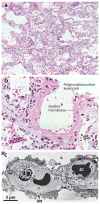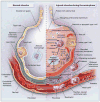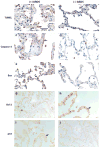The acute respiratory distress syndrome: pathogenesis and treatment
- PMID: 20936936
- PMCID: PMC3108259
- DOI: 10.1146/annurev-pathol-011110-130158
The acute respiratory distress syndrome: pathogenesis and treatment
Abstract
The acute respiratory distress syndrome (ARDS) causes 40% mortality in approximately 200,000 critically ill patients annually in the United States. ARDS is caused by protein-rich pulmonary edema that causes severe hypoxemia and impaired carbon dioxide excretion. The clinical disorders associated with the development of ARDS include sepsis, pneumonia, aspiration of gastric contents, and major trauma. The lung injury is caused primarily by neutrophil-dependent and platelet-dependent damage to the endothelial and epithelial barriers of the lung. Resolution is delayed because of injury to the lung epithelial barrier, which prevents removal of alveolar edema fluid and deprives the lung of adequate quantities of surfactant. Lymphocytes may play a role in resolution of lung injury. Mortality has been markedly reduced with a lung-protective ventilatory strategy. However, there is no effective pharmacologic therapy, although cell-based therapy and other therapies currently being tested in clinical trials may provide novel treatments for ARDS.
Figures







References
-
- Ashbaugh DG, Bigelow DB, Petty TL, Levine BE. Acute respiratory distress in adults. Lancet. 1967;2:319–23. - PubMed
-
- Ware LB, Matthay MA. The acute respiratory distress syndrome. N Engl J Med. 2000;342:1334–49. - PubMed
-
- Bachofen M, Weibel ER. Alterations of the gas exchange apparatus in adult respiratory insufficiency associated with septicemia. Am Rev Respir Dis. 1977;116:589–615. - PubMed
-
- Rubenfeld GD, Caldwell E, Peabody E, Weaver J, Martin DP, et al. Incidence and outcomes of acute lung injury. N Engl J Med. 2005;353:1685–93. - PubMed
-
- Flori HR, Glidden DV, Rutherford GW, Matthay MA. Pediatric acute lung injury: prospective evaluation of risk factors associated with mortality. Am J Respir Crit Care Med. 2005;171:995–1001. - PubMed
Publication types
MeSH terms
Grants and funding
LinkOut - more resources
Full Text Sources
Other Literature Sources
Medical

